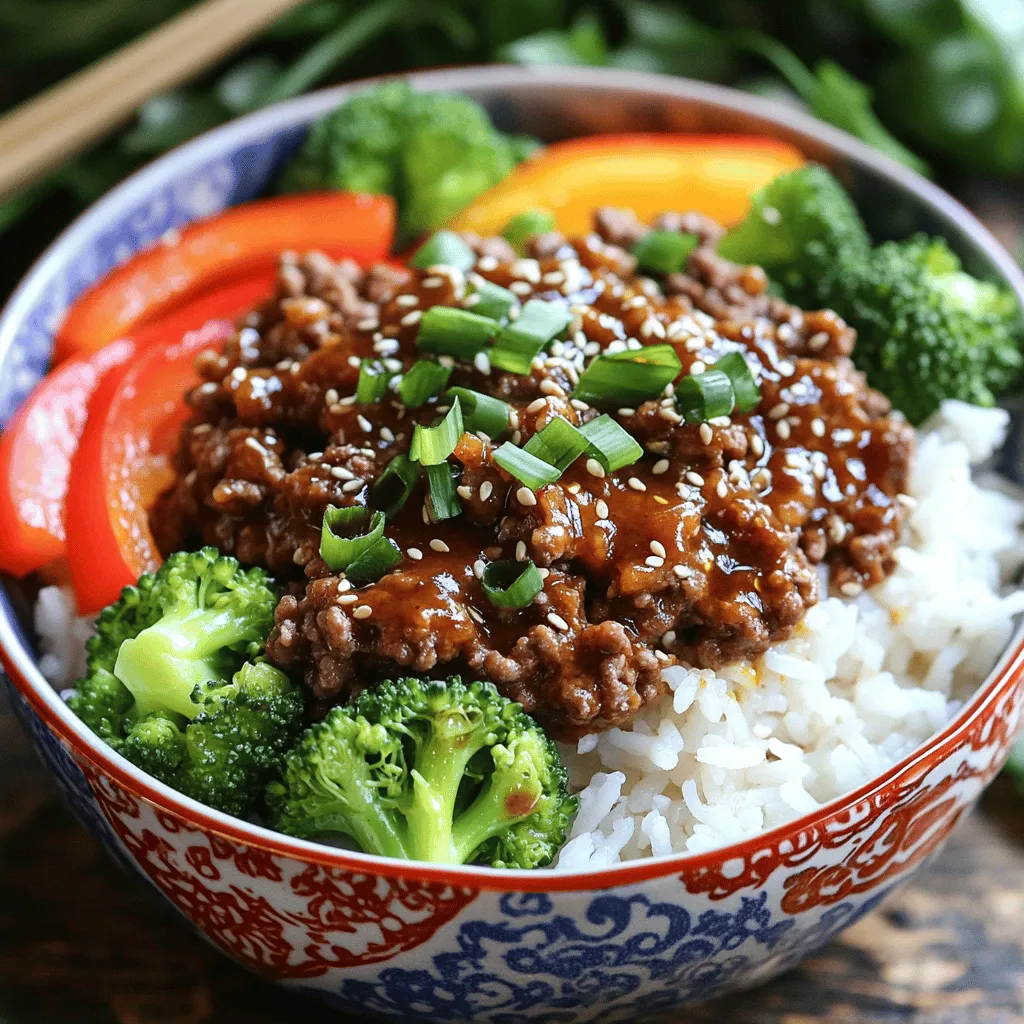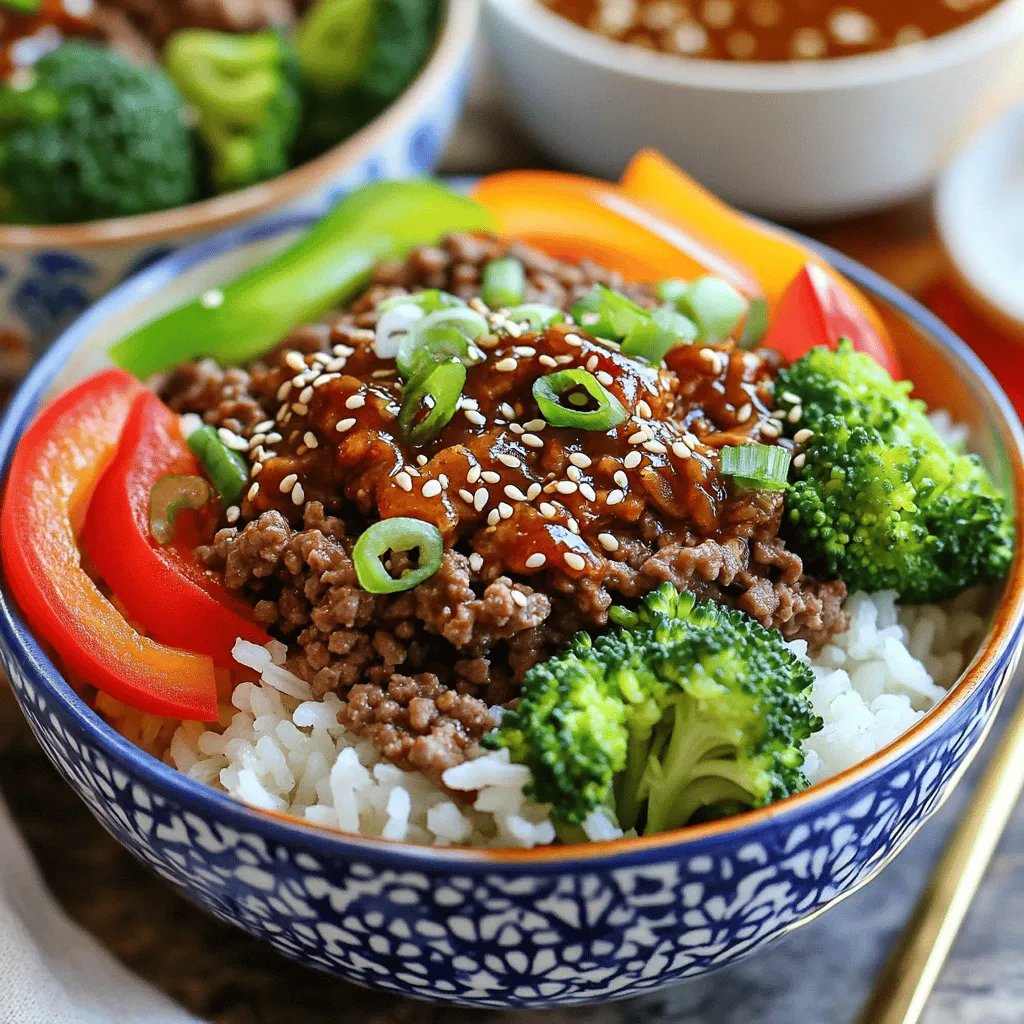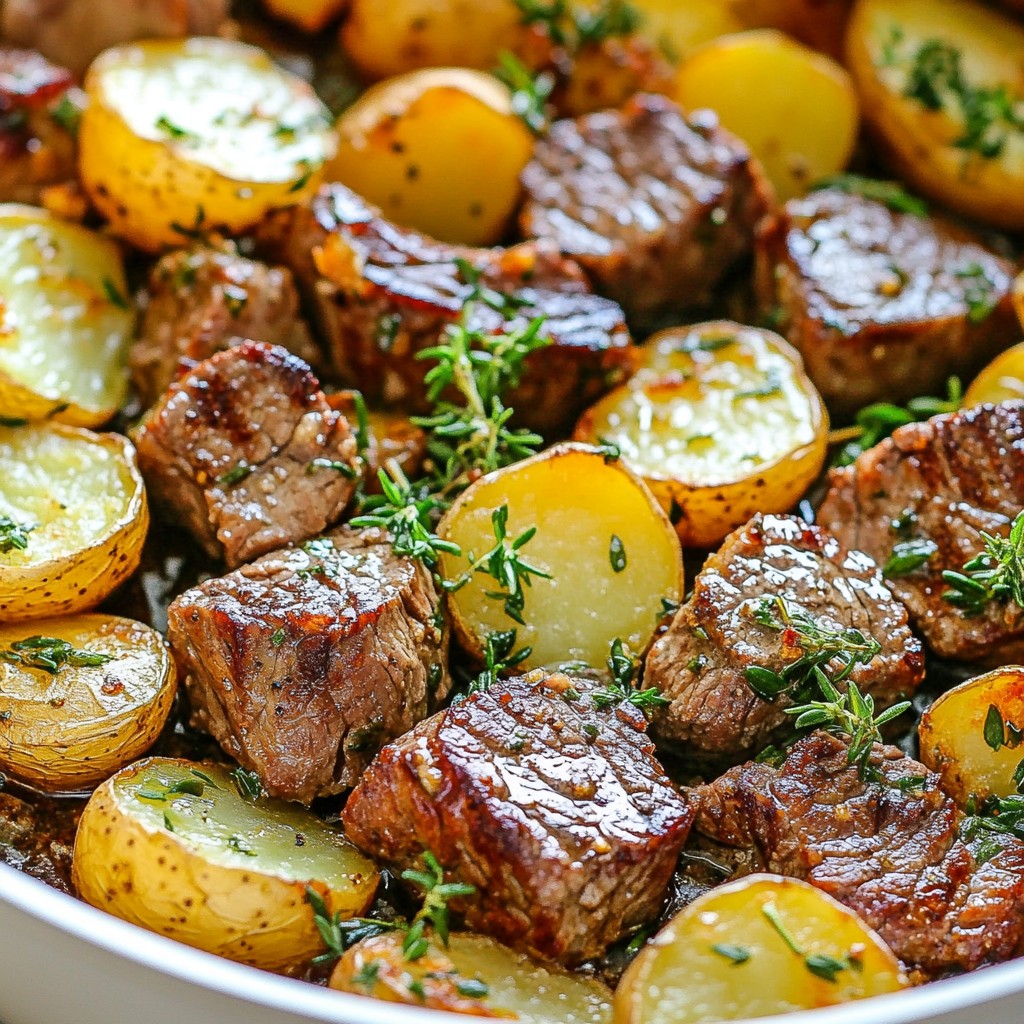Get ready to spice up your dinner routine with my simple Spicy Korean Beef Bowls! In just a few steps, you’ll transform easy ingredients into a flavorful meal that bursts with taste. This dish combines juicy beef, fresh vegetables, and a kick of heat from gochujang, making it a fantastic weeknight dinner option. Let me show you how to create this delicious bowl of goodness!
Ingredients
To make Spicy Korean Beef Bowls, gather these simple ingredients:
– 1 lb ground beef (preferably lean)
– 1 tablespoon sesame oil
– 2 tablespoons soy sauce
– 2 tablespoons gochujang (Korean chili paste)
– 2 teaspoons brown sugar
– 3 cloves garlic, minced
– 1-inch piece ginger, grated
– 1 cup broccoli florets
– 1 red bell pepper, sliced
– 1 cup cooked jasmine rice
– 2 green onions, thinly sliced (for garnish)
– Sesame seeds (for garnish)
These ingredients create a great mix of flavors. The gochujang adds heat and depth. The sesame oil gives a nice nutty taste. Use fresh vegetables for the best crunch. You can find gochujang at Asian markets or online. Fresh ginger and garlic make the dish smell amazing while cooking.
This recipe is flexible. You can swap the beef for chicken or tofu if you prefer. Each option will change the flavor but keep it tasty. For a heartier meal, add more veggies like carrots or snap peas.Enjoy the process!
Step-by-Step Instructions
Prepare Your Ingredients
Before you start cooking, gather all your ingredients. This helps the process go smoothly. Here’s what you need:
– 1 lb ground beef (preferably lean)
– 1 tablespoon sesame oil
– 2 tablespoons soy sauce
– 2 tablespoons gochujang (Korean chili paste)
– 2 teaspoons brown sugar
– 3 cloves garlic, minced
– 1-inch piece ginger, grated
– 1 cup broccoli florets
– 1 red bell pepper, sliced
– 1 cup cooked jasmine rice
– 2 green onions, thinly sliced (for garnish)
– Sesame seeds (for garnish)
Start by washing the vegetables. Cut the red bell pepper into thin slices. Grate the ginger and mince the garlic. This prep makes cooking fast and easy.
For a great outcome, use a large skillet. This ensures even cooking. Also, make sure your beef is at room temperature. This helps it cook evenly.
Cooking Process
Now let’s cook! First, heat the skillet. Pour in the sesame oil and warm it over medium-high heat. Once hot, add the ground beef. Use a wooden spoon to break it apart. Cook for about 5-7 minutes. You want the beef to be browned and fully cooked.
Next, it’s time to add flavor. Stir in the soy sauce, gochujang, brown sugar, minced garlic, and grated ginger. Cook for another 2-3 minutes. Stir occasionally, so everything mixes well.
While the beef cooks, it’s time to steam the veggies. In a small pot, boil water. Place the broccoli and red bell pepper in a steamer basket. Steam for about 4-5 minutes until they are vibrant and tender.
Serving Suggestions
Now, let’s plate your dish! Start by adding a generous scoop of jasmine rice to each bowl. Top it with the spicy beef mixture. Artfully arrange the steamed broccoli and red bell pepper around the beef.
For a beautiful finish, garnish with sliced green onions and a sprinkle of sesame seeds. This adds crunch and flavor.
To make your meal even more appealing, serve with chopsticks or a fork. You can also place extra sesame seeds in a small dish on the side. This way, guests can add more if they like. Using colorful bowls will enhance the overall look of your meal. Enjoy!
Tips & Tricks
Cooking Techniques
– To brown the beef perfectly, use high heat. This helps to create a nice crust. Make sure not to overcrowd the pan. Cook in batches if needed. Stir the beef often for even cooking.
– For the vegetables, steaming helps keep their bright color and crunch. Bring water to a boil in a pot. Place broccoli and red bell pepper in a steamer basket. Cover and steam for about 4-5 minutes. They should be tender but still vibrant.
Flavor Enhancements
– To adjust the spice level, simply add more or less gochujang. Taste as you go to find your sweet spot. If you’re sensitive to heat, start with a smaller amount. You can always add more later.
– Get creative with toppings! Try adding sliced cucumbers or shredded carrots for freshness. A sprinkle of crushed peanuts adds a great crunch. Fresh herbs like cilantro can also boost flavor.
Kitchen Tools
– Essential tools for this recipe include a large skillet for the beef and a steamer basket for the veggies. A wooden spoon is great for breaking apart the beef while cooking.
– I recommend brands like T-fal for skillets and OXO for steamers. They provide good heat distribution and durability. Having the right tools makes cooking more enjoyable and easier.

Variations
Dietary Modifications
For those who need gluten-free options, try using tamari instead of soy sauce. Tamari has a similar taste but contains no gluten. You can also swap out gochujang for a gluten-free chili paste. For vegetarians, replace the beef with tofu or tempeh. These non-meat proteins soak up flavors well.
Ingredient Swaps
You can easily switch out the beef for chicken or turkey. These meats give a lighter feel to the dish. If you prefer, try using tofu for a plant-based option. Don’t forget to add unique veggies. Carrots, snap peas, or mushrooms can bring new flavors and textures.
Regional Influences
Korean recipes vary by region. You might find variations that include different spices or side dishes. For example, some regions add kimchi for extra heat and flavor. You can also take flavors from other cuisines. Adding sesame oil and soy sauce with a splash of lime can create a fusion twist!
Storage Info
Leftovers Storage
To keep your Spicy Korean Beef Bowls fresh, store them in an airtight container. Place the beef, rice, and veggies in separate containers to prevent sogginess. This meal will stay fresh in the fridge for about 3 days. After that, it may lose flavor and texture.
Reheating Instructions
To reheat your beef bowls, use the microwave for quick convenience. Heat in 30-second intervals, stirring in between. This method keeps the beef juicy and the veggies crisp. If you want to freeze the dish, pack it in a freezer-safe container. It can last up to 3 months. To use, thaw overnight in the fridge and reheat as described.
Meal Prep Ideas
For busy weeknights, cook the beef and veggies ahead of time. You can make a large batch of rice too. Store everything separately in containers. When you’re ready to eat, just combine and heat. A great combo is to pair the beef with steamed broccoli and sliced bell peppers. This meal is not only tasty but also easy to prepare!
FAQs
How do I make Spicy Korean Beef Bowls in less than 30 minutes?
To cook this dish fast, prep your ingredients first. Chop veggies and measure sauces ahead. Use lean ground beef for quick cooking. A large skillet heats up quickly, speeding up the process. Cook beef for just 5-7 minutes. Stir in sauces for a quick flavor boost.
Can I make this dish ahead of time?
Yes, you can! Cook the beef mixture and cool it down. Store it in an airtight container in the fridge. You can make the rice and veggies ahead as well. When ready to eat, just reheat and serve. This way, you enjoy a fresh meal with less fuss.
What to serve with Spicy Korean Beef Bowls?
Serve this dish with steamed rice for a complete meal. You can also add a side of kimchi for extra flavor. A light salad or pickled veggies pairs well too. For drinks, try iced tea or a light beer to balance the spice.
Is gochujang spicy for everyone?
Gochujang has a unique heat that can vary. If you’re sensitive to spice, start with less. You can mix it with other sauces to tone it down. Adding sugar helps balance the heat too. Taste as you go to find your perfect level.
What is the origin of Spicy Korean Beef Bowls?
Spicy Korean Beef Bowls come from Korean home cooking. This dish reflects the bold flavors of Korean cuisine. Gochujang is a staple, adding depth and spice. It’s often enjoyed as a simple meal that brings family together. The dish showcases the love for fresh ingredients and balance in flavors. Enjoying it connects you to Korean culture and its vibrant food scene.
In this blog post, we explored how to make Spicy Korean Beef Bowls. We covered the ingredients, cooking steps, and serving ideas. You learned tips for enhancing flavor and modifying the recipe for various diets. Remember, storing leftovers properly keeps them fresh. Whether you’re cooking for yourself or a crowd, this dish is both tasty and easy. Try it with different proteins or spices to make it your own. Enjoy your cooking adventure and savor each bite!




